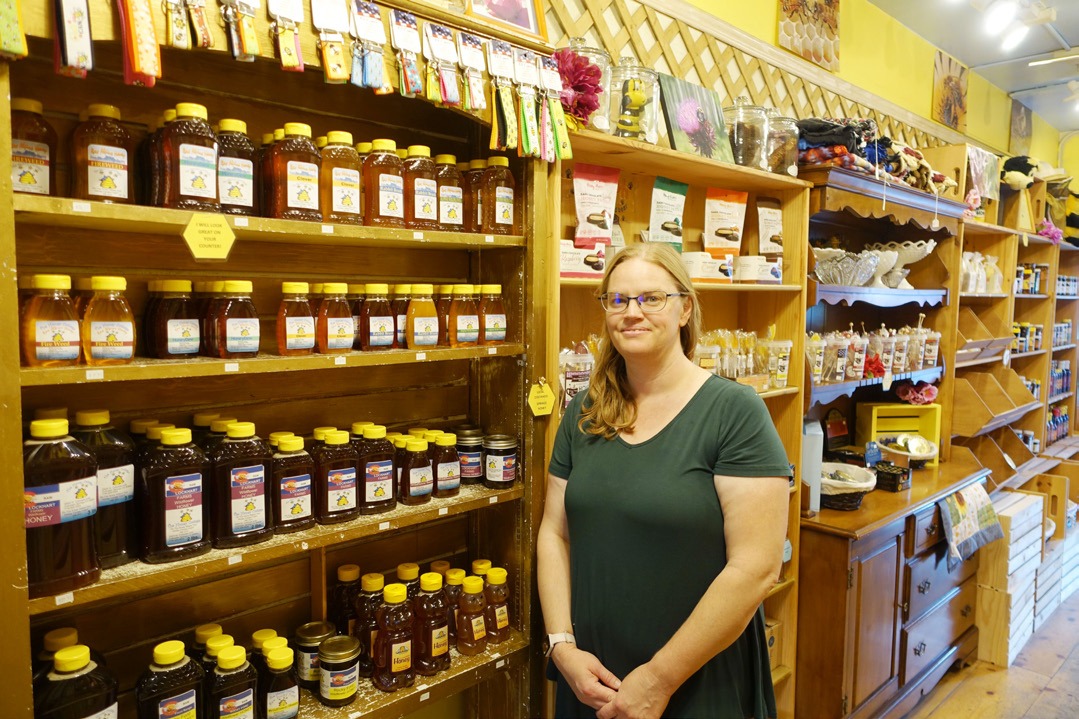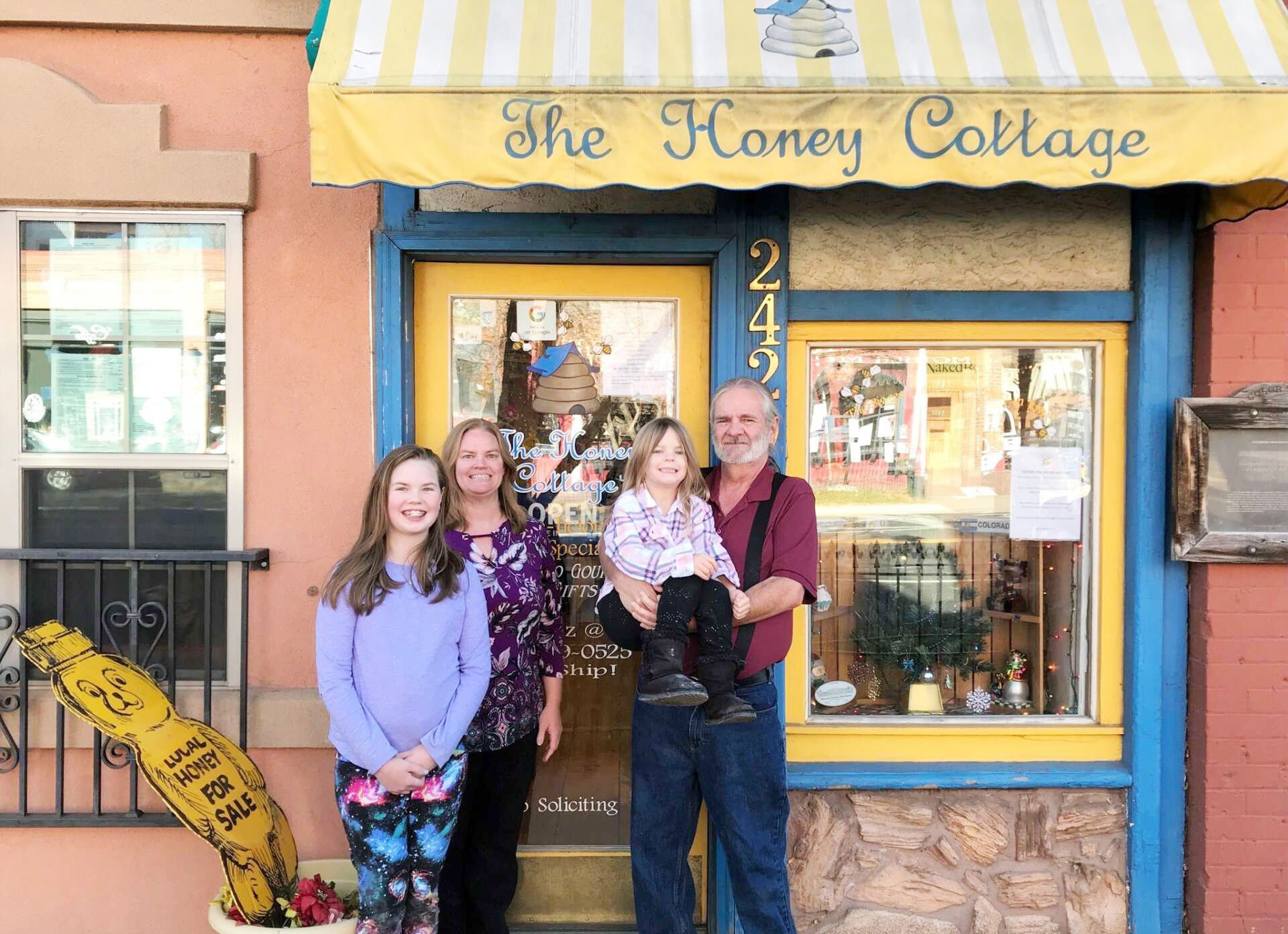Stepping into the Honey Cottage, one has the chance to taste the melon fields of Rocky Ford, the swamplands of Georgia, the Kiawe forests of Hawaii, and the rainforests of Togo, Africa. Yet for owners Frank and Crystal Seeley, they are more than gustatory travel agents, but fellow travelers in their journey for a sweet and sustainable existence.
Eleven years ago, they received a call from Honey Cottage’s founder Pat William inviting them to take over the business. At the time, Crystal was enrolled at the University of Colorado at Colorado Springs working on her bachelor’s in nutrition. She decided to stop her studies to take over the business. They’ve been busy as bees ever since.
Crystal came to Colorado as a teenager. She earned an associate’s degree in culinary arts at Pikes Peak Community College (now Pikes Peak State College), from which her interest in nutrition sprouted. Frank, a 64-year-old Colorado Springs native, has worked as a gardener, a maintenance man and in numerous trades in construction. The two met over 20 years ago, raising two children of their own.
“If you’re not handsome, you better be handy,” joked Frank.
Frank’s foray into honey began over three decades ago. At the time, his five-year-old son had severe allergies and asthma which, despite months of treatment with expensive pharmaceutical medications, was not improving. Frank began incorporating raw honey into his child’s diet, seeing improvement until he was thriving without medication. This started Frank’s appreciation for honey’s nutritional benefits and led to his love for beekeeping, which has continued until today.

“He really loved how bees were interconnected with our universe and how they were very, very necessary for the different things we do in nature,” says Crystal.
Honeybees produce honey by harvesting nectar from flowering plants and processing it in their hives. In the process, they pollinate the plant, which allows them to reproduce and make seeds. The plants characteristics all contribute to the consistency, color and taste of the honey that is ultimately produced. Many honeys are named after the predominant plant from which they obtain flower nectar such as clover, fireweed, carrots, lavender, just to name a few.
If you take care of the bees, they’ll take care of you. – Frank Seeley
There are exceptions, of course. When Frank was learning about the honey from Togo, Africa, he sheepishly recalled asking the vendor about the honey’s predominant flower.

“She nicely tried not to laugh, but you could see her laughing and just said ‘Honey, we’re in the rain forest, there’s thousands of flowers. We can’t tell you. The bees don’t tell us.'”
Over the years, Frank and Crystal have learned about raw honey’s nutritional benefits compared to the refined sugar present in the increasingly processed American diet. It has led to other dietary changes that have helped Frank lose weight and avoid diabetic medication.
When Frank first started beekeeping, beekeepers saved enough honey to feed their honeybees over the winter. However, in more recent years, Frank has seen how some beekeepers, especially large outfits, feed honeybees with corn syrup and sugar water to maximize production and make up for the scarcity of plants. In his opinion, this is not only an abuse of the natural food system, but also produces a nutritionally inferior honey because these substitutes lack the nutrients that flower nectar possesses. He compares the practice to the milk of a breastfeeding woman who exclusively eats Twinkies.
“What goes in dictates what goes out,” he said.
He sees this practice as not only harmful to humans but also to honeybees and the greater environment. To Frank, part of beekeeping responsibly is doing it in areas with enough vegetation in a sustainable environment, maintaining a healthy balance in the ecosystem. Because of this, the Seeleys vet their vendors, several of which are local producers in Colorado, to maintain the integrity of the product.
Despite its value, Crystal is quick to point out, even as a honey saleswoman, that honey in excess is equally problematic and is hardly a golden ticket.
“Don’t think you can just substitute all your sugar habits with drinking a gallon of honey…that’s not a good thing,” she said.
As is the case with even the best of medications, lifestyle changes remain essential. Crystal witnessed the health consequences of poor lifestyle choices when taking care of her father who had diabetes.
For Frank, a key lifestyle change has been giving up sugary juices and heavily processed breads. For Crystal, it is being consistent with her exercise classes and making time to prepare her own meals.
“We live in a fast-paced society,” she said. “We have a choice to live in that fast-paced society, or we have a choice to slow down and say, my family’s health is more important. As I’ve learned over the many years of having my kids, you only get 18 years with them … You need to slow down and enjoy that time, or you’re gonna miss all of those golden moments that are there. And so, for us, that’s another reason why health has been such a big deal is because we want them to grow to be happy [and] healthy.”
Frank and Crystal’s efforts have also produced another fruit. Their eldest daughter, Lily, has been assisting Frank at events, giving presentations about honey, and learning beekeeping as well.
For the Seeley’s, honey is more than a golden goose; it’s about educating customers about food and connecting them with its natural sources. As bees give back to the plants they pollinate, the Seeleys seek to do the same for the community, because as Frank likes to say, “If you take care of the bees, they’ll take care of you.”
Get out and go:
The Honey Cottage
2429 W. Colorado Ave.
Tues.-Sat., 11 a.m.-5 p.m.
719-329-0525
TheHoneyCottage.com

